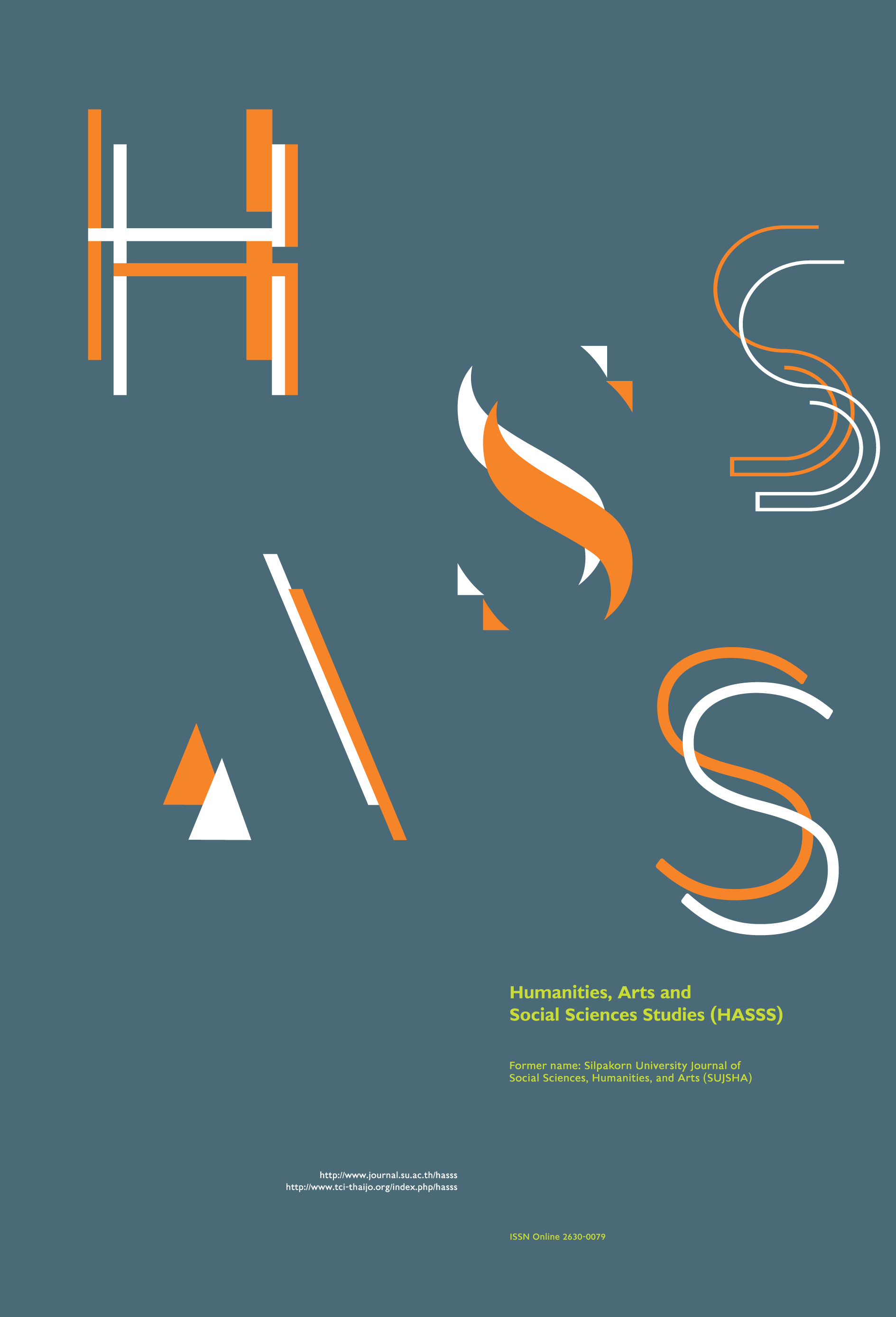Communication process to empower youth digital citizenship in the Esan toom home network
Main Article Content
Abstract
This paper aimed to study the implementation of a participatory communication process that empowers digital citizenship, as well as investigating the effects of the digital citizenship process on youths in the northeast region of Thailand. A mixed-methods research approach was used. The sample comprised a total of 40 young people involved in the Esan Toom Home Project. The findings revealed that the process of participatory communication helped in fostering digital citizenship among youths in the northeast region, consisting specifically of (1) improving the digital citizenship capacity of youth volunteers, whose roles involved initiating ideas, creating, performing, or engaging in the communication process, and production of media or innovative ideas that were responsive to the community context; (2) fostering participation in the communication process, in which youth volunteers were involved in formulating, designing, and deciding the form of communication; (3) producing creative media or innovative ideas that resulted from the engagement of youth volunteers and which were tailored to the local context; (4) incorporation of knowledge and concepts throughout the operation of the process, and (5) the support and engagement of networks at both the local and national levels. The digital citizenship process for youth in the northeast region has a positive effect on four areas, namely, (1) youth volunteers, (2) children and young people participating in the program, (3) communities and residents, and (4) policies.
Downloads
Article Details
All rights reserved. Apart from citations for the purposes of research, private study, or criticism and review,no part of this publication may be reproduced, stored or transmitted in any other form without prior written permission by the publisher.
References
Abs, H. J. and Veldhuis, R. (2006). Indicators on active citizenship for democracy - the social, cultural and economic domain. Paper Presented at the European Commission’s Joint Research Center. Ispra, Italy. [Online URL: https://www.pedocs.de/frontdoor.php?la=en&source_opus=1879] accessed on November 04, 2009.
Allatt, P. (2001). Critical Discussion: Globalization and Empowerment. In Youth, Citizenship and Empowerment, edited by H. Helve and C. Wallace, pp. 250-259. Aldershot: Ashgate.
Arches, J. and Fleming, J. (2006). Young people and social action: youth participation in the United Kingdom and United States. New Directions for Youth Development 2006(111): 81-90.
Bawden, D. (2001). Information and digital literacies: a review of concepts. Journal of Documentation 57(2): 218-259.
Bawden, D. (2008). Origins and Concepts of Digital Literacy. In Digital Literacies: Concepts, Policies and Practices, edited by C. Lankshear and M. Knobel, pp. 17–32. New York: Peter Lang.
Belshaw, D. (2012). What is ‘digital literacy’? A Pragmatic investigation. Doctoral Thesis. Durham University, United Kingdom.
Bynner, J., Chisholm, L. and Furlong, A. (1997). Youth, Citizenship and Social Change in European Context. Aldershot: Ashgate.
Checkoway, B. (2011). What is youth participation? Children and Youth Services Review 33(2): 340-345.
Damrongkiattisak, W. (2015). Digital Citizenship. Chiang Mai: Faculty of Information and Communication.
Frazer, E. and Emler, N. (1997). Participation and Citizenship: A New Agenda for Youth Politics Research. In Youth, Citizenship and Social Change in A European Context, edited by J. Bynner, L. Chisholm and A. Furlong, pp. 171-195. Aldershot: Ashgate.
Hague, C. and Williamson, B. (2009). Digital Participation, Digital Literacy, And School Subjects: A Review of The Policies, Literature and Evidence. Bristol: Futurelab.
Jolls, T. and Thoman, E. (2008). Literacy for the 21st Century: An Overview & Orientation Guide to Media Literacy Education. CA: Centre for Media Literacy.
Lindström, L. (2010). Citizenship and empowering processes: a study of youth experiences of participation in leisure activities. Citizenship, Social and Economics Education 9(3): 193-208.
Loader, B. D., Vromen, A. and Xenos, M. A. (2014). The networked young citizen: Social media, political participation and civic engagement. Information, Communication and Society 17(2): 143-150.
Martin, A. (2006). Literacies for the Digital Age. In Digital Literacies for Learning, edited by A. Martin and D. Madigan, pp. 3-25. London: Facet.
Martínez, X. Ú., Jiménez-Morales, M., Masó, P. S. and Jaume, T. B. (2017). Exploring the conceptualization and research of empowerment in the field of youth. International Journal of Adolescence Youth 22(4): 405-418.
Melkote, S. R. and Steeves, H. L. (2001). Communication for Development in The Third World: Theory and Practice for Empowerment. New Delhi: Sage Publications.
Mihailidis, P. (2014). Media Literacy and The Emerging Citizen: Youth, Participation and Engagement in Digital Culture. New York: Peter Lang.
Mike, R. (2011). Digital Citizenship in Schools. 2nd ed. Washington DC: International Society for Technology in Education.
Ministry of Education. (2008). The Basic Education Core Curriculum B.E. 2551. Bangkok: Education Office.
Mitchell, L. (2016). Beyond digital citizenship. Middle Grades Review 1(3): 1-6.
Ribble, M. S. and Bailey, G. D. (2004). Digital citizenship focus questions for implementation. Learning and Leading with Technology 32(2): 12-15.
Ribble, M. S. and Bailey, G. D. (2011). Digital Citizenship in Schools. Washington DC: International Society for Technology in Education.
Servaes, J. (1996). Participatory communication research with new social movements: A realistic utopia. In Participatory Communication for Social Change, edited by J. Servaes, T. L. Jacobson and S. A. White, pp. 74-76. UK: Sage Publications.
Singhal, A. and Stapitanond, P. (1996). The role of communication in development: Lessons learned from a critique of the dominant, dependency, and alternative paradigms. The Journal of Development Communication 7(1): 10-25.
Subrahmanyam, K. and Smahel, D. (2010). Digital Youth: The Role of Media in Development. New York, NY: Springer Science & Business Media.
Tsekoura, M. (2016). Space for youth participation and youth empowerment: Case studies from UK and Greece. Young 24(4): 326-341.
Vega, V. and Robb, M. B. (2019). The Common Sense Census: Inside the 21st-Century Classroom. San Francisco, CA: Common Sense Media.
Weerakunthewan, S. (2018). Media Literacy: The Power in the Hand of Digital Citizenship. [Online URL: https://www.commonsensemedia.org/about-us/our-mission] accessed on January 4, 2019.
Westheimer, J. (2015). What Kind of Citizen? Educating Our Children for The Common Good. New York: Teachers College Press.
Westheimer, J. and Kahne, J. (2004). Educating the “good” citizen: political choices and pedagogical goals. Political Science and Politics 37(2): 241-247.


